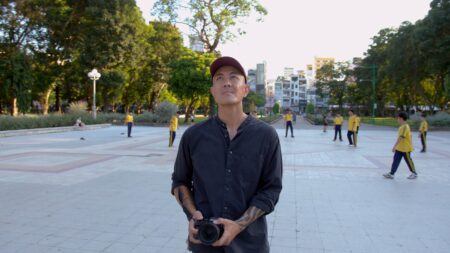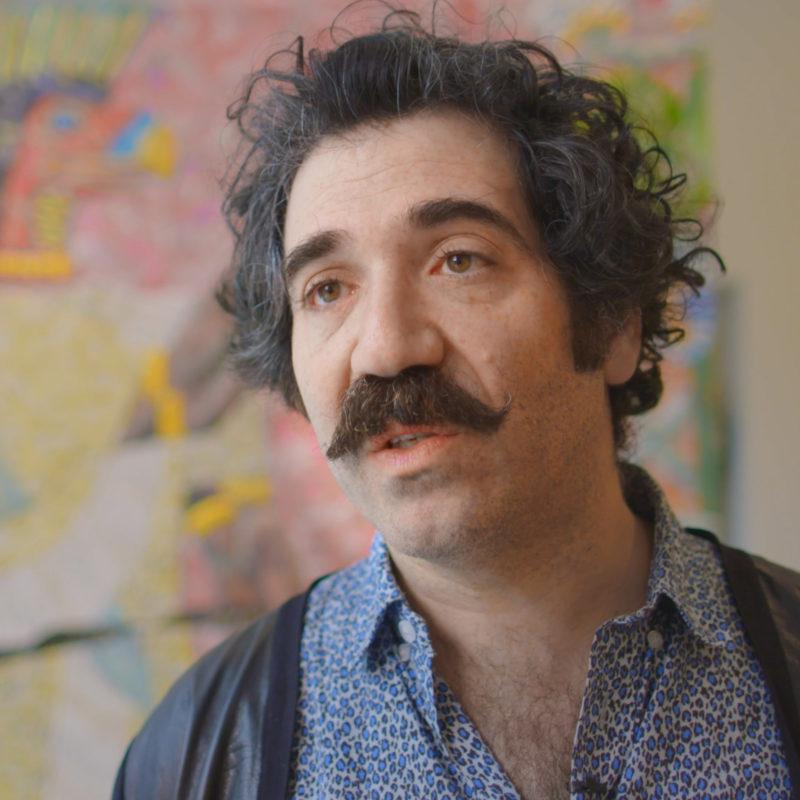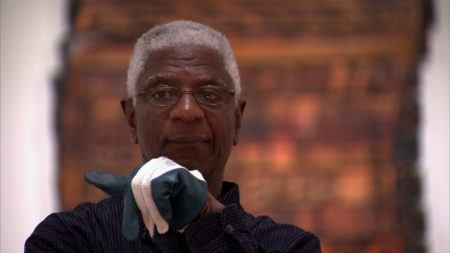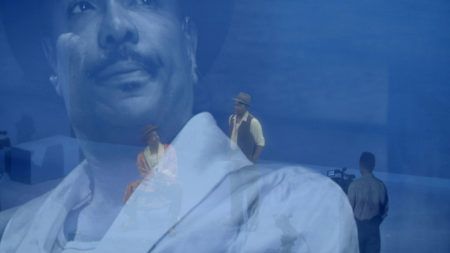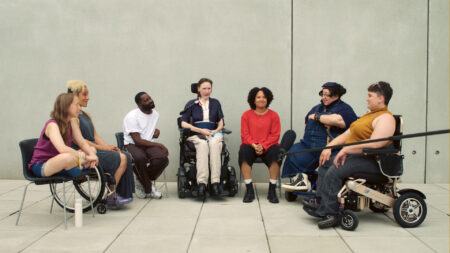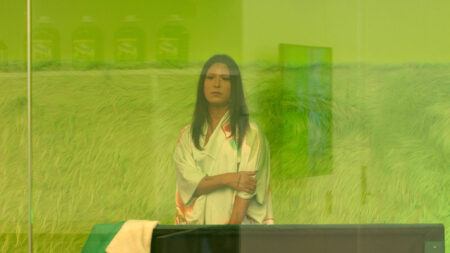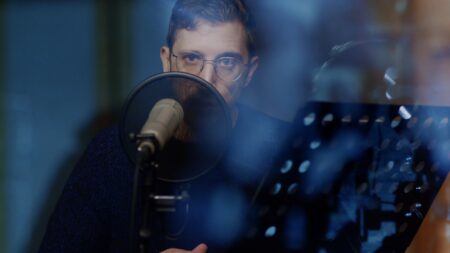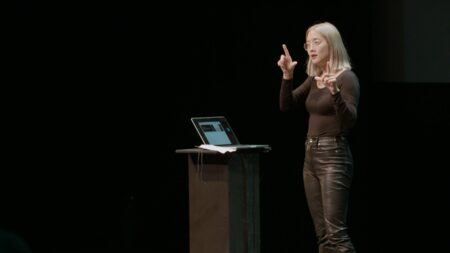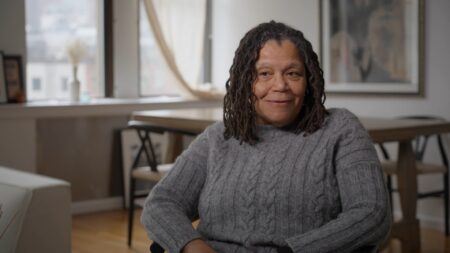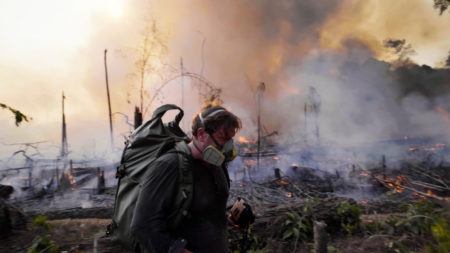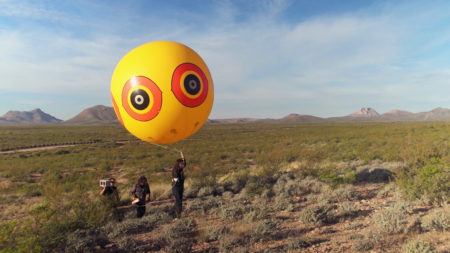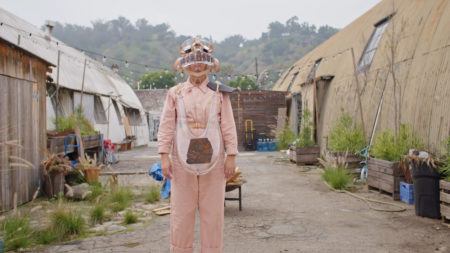Continue playing
(Time remaining: )
Play from beginning
Continue playing "{{ controller.videos[controller.getVideo(controller.currentVideo)].segmentParentTitle}}"
{{controller.videos[controller.getVideo(controller.currentVideo)].title}} has ended.
Haunting the WestMichael Rakowitz
Visit our Awards page for this film’s honors and recognition.
Drawing upon his Iraqi-Jewish heritage, Michael Rakowitz critiques ongoing systems of colonization in his sculptural and participatory work. The artist recounts a formative memory from his childhood, when his mother took him to see reliefs depicting the lion hunt of Ashurbanipal in the Assyrian galleries at the British Museum and posed the question, “What is this doing here?” For Rakowitz, this moment crystalized his understanding of museums as places of extraction, colonization, and crime. In his work today, Rakowitz explores ways to subvert the imperialist role of museums, interrogate the value they place on objects over people, and create ongoing systems for repair and accountability.
From Jane Lombard Gallery in New York City, Rakowitz shares his recent bas-reliefs, Room F, section 1, Northwest Palace of Nimrud (2020), as part of his ongoing project, The invisible enemy should not exist, which began in 2007. Originally focused on creating the more than 8,000 artifacts looted from the National Museum of Iraq following the 2003 U.S. invasion, the project has expanded to include architectural reliefs stolen from the Assyrian palace of Nimrud, which was destroyed by ISIS in 2015. Rakowitz refers to his works as “ghosts” of the original artifacts, returning to haunt Western institutions. He uses the packaging of Middle Eastern food goods as papier mâché to create the reliefs and sculptures shown at Jane Lombard Gallery and the Wellin Museum of Art at Hamilton College, explaining that “if a ghost is going to properly haunt, it has to appear differently than the entity appeared when it was living.”
Rakowitz recounts his grandparents’ journey, fleeing from Iraq following the farhud, a violent dispossession of Jews from Baghdad in the 1940s, and subsequently immigrating to the U.S. He calls them as “the first installation artists” that he ever met, describing the importance of the Iraqi objects, furnishings, and food that filled their home. Now, food packaging and products function symbolically in the artist’s work, from his Enemy Kitchen (ongoing from 2003) cooking workshops to his monumental Lamassu of Nineveh (2018) sculpture, composed of Iraqi date syrup cans and installed on the Fourth Plinth in London’s Trafalgar Square. These works offer new ways to discuss Iraq and Iraqi culture outside of media narratives of war and violence, while addressing issues of empire and provenance, and proposing routes for decolonization.
At his studio in Chicago, Rakowitz describes the importance of keeping his studio connected while working apart during the COVID-19 pandemic. His assistants work independently on sculptures and busts from their homes and then gather at the studio’s outdoor space to review their work and pick up more materials. For Rakowitz, this project to create over 8,000 missing Iraqi artifacts, much like decolonization, is an ongoing process—one that will likely outlive both the artist and his studio.
Credits
Producer: Ian Forster. Interview: Ian Forster. Editor: Thomas Niles. Colorist: Jonah Greenstein. Sound Mix: Adam Boese. Camera: Jarred Alterman, Ian Forster, Andrew Kemp, and Keith Walker. Assistant Camera: Charlie Stoddart. Sound: Rich Pooler. Music: Blue Dot Sessions and Nazem al-Ghazali. Archival Material: ABC; CBS; CNN; Daoud Shamoon Family Archive; Beit Hatfutsot; Caius Julyan, Pond5; The Metropolitan Museum of Art; Montalvo Arts Center; Otniel Margalit Collection; Pandastock, Pond5; Dr. Osama Shukir Muhammed Amin; and UNESCO.
Extended Play is supported by The Andy Warhol Foundation for the Arts; and, in part, by public funds from the New York City Department of Cultural Affairs in partnership with the City Council; Dawn and Chris Fleischner; the Art21 Contemporary Council; and by individual contributors.
Closed captionsAvailable in English, German, Romanian, Italian, Japanese, Korean, Chinese, Italian
Through the Art21 Translation Project, multilingual audiences from around the globe can contribute translations, making Art21 films more accessible worldwide. Translate this video now.
Interested in showing this film in an exhibition or public screening? To license this video please visit Licensing & Reproduction.
Michael Rakowitz was born in 1973 in Great Neck, NY. The artist draws upon extensive research on cultural objects and events, in order to weave together complex histories and unlikely symbols in his sculptures, installations, participatory workshops, films, and architectural interventions. His Iraqi-Jewish heritage and the damage caused by long conflicts between the West and the Middle East also serve as important influences for his work. Rakowitz critiques the ongoing forces of colonization, bringing attention not only to the value of cultural artifacts that have been lost, looted, or destroyed but also to the people who have suffered from continuing violence. His work asks viewers to reconsider the relationships between hospitality and hostility, and provenance and expropriation, and to confront the complicity of cultural institutions and audiences in geopolitical matters.
“If we’re to have conversations about what decolonization truly looks like, it’s accompanied by repair and it’s accompanied by accountability. That work is actually something that’s never done.”
Michael Rakowitz
History Reimagined
Yinka Shonibare CBE RA
